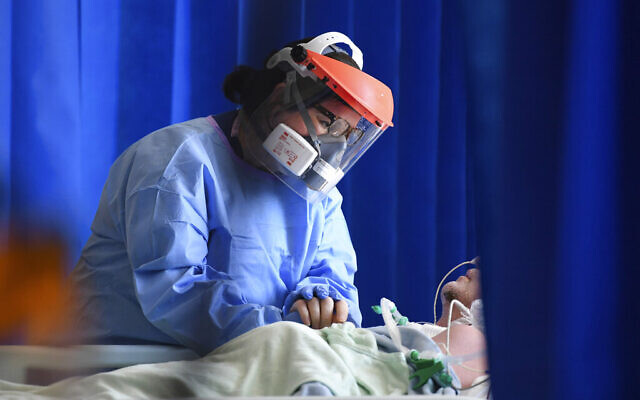- Joined
- Feb 26, 2019
- Messages
- 12,449
- Points
- 113
At least 16,000 long-term sick in covid - Cecilia, 40, has been ill for over a year
To date, more than one million Swedes have been found infected with the coronavirus. For many, the symptoms go away, but for some people, the symptoms of the disease remain. Exactly how many people today suffer from postcovid, or long-term covid, is not clear. According to a survey conducted by Swedish Radio Ekot, more than 16,000 Swedes have so far been diagnosed.
One of them is Cecilia Chrapkowska, 40.
- It is difficult to buy food if some of what I ordered online runs out. I choose the store with the least area and rest in the car afterwards, she says.
Before the pandemic, Cecilia Chrapkowska worked as a pediatrician, while researching and doing her doctorate. She was active and loved cycling. But in March 2020, she received covid-19. When the symptoms did not go away, even though time passed, she understood that something was not right.
- I had over 38 degrees fever for several months, and for three months between 39 and 40 every day. It is not possible to explain away. Before I received heart medication for my POTS (a complication of covid that makes the body unable to regulate blood flow when standing up, editor's note) I also became faint as soon as I stood up, and I had constant headaches and memory difficulties.
"Feels hopeful that research is being conducted"
The months passed and Cecilia Chrapkowska's health did not improve. After several doctor visits, it was finally established that she has postcovid, and since a few months ago, until recently, she has been cared for at Karolinska Hospital's postcovid clinic in Solna.
The symptoms of people with postcovid vary greatly. For some people, it is mainly a matter of loss of taste and smell or changes. For others, such as Cecilia Chraptowska, several internal organs have been damaged by the disease.
- I belong to the worse part of the scale, which has been on part-time sick leave for more than a year.
But there are those who feel even worse. The whole spectrum is there, and care is needed for everyone. She says she is feeling much better now, thanks to medication and the right type of treatment.
- If you had asked me three months ago, I would have said that the biggest difference from the time before I became ill was that I could not do anything. It was hard to bear to watch TV. Now I am mostly physically limited, and not very much mentally, although of course I do not have the same energy as before I became ill.

Cecilia Chrapkowska, 40.
And there are more flashes of light, says Cecilia Chraptowska. In a few weeks she will get an electric wheelchair.
- Today I can not go for a walk with my children or my friends. When we have all been vaccinated and everything opens, I want the electric wheelchair, so I can go to museums, travel and work at the hospital again, and not just from home, she says.
At the beginning of the pandemic, there was neither research nor care for the postcovid. Now, more than a year later, research has come a long way.
- The most basic thing has been to go to a clinic where the doctors know more than I do, and where there is no mistrust. I do not think I will heal myself. On the other hand, it feels hopeful that research is being conducted on this ... it is my hope for the future, she says, and continues:
- I think they will find effective medical treatments. And finally, maybe I can hop out of my electric wheelchair and ride my bike again.
Large dark number
The number of referrals for patients with persistent symptoms after covid increased sharply during the autumn of 2020 in Sweden, according to Region Uppsala's data.
In Ekot's survey, the number of patients from primary care has been added up with patients in inpatient care and open specialist medical care. The registers do not state how many people suffer from mild ailments, and how many have ailment that requires intervention by the health service.
Judith Bruchfeld, chief physician and infection specialist at the University Hospital in Solna, tells the radio that she believes that the number of people who have postcovid is more than the figures show. The diagnosis was introduced in the autumn and the number of cases can be large, according to Judith Bruchfeld.
- I judge that it is an underestimation in number, given the percentages that come from other countries about how many develop long-term effects. The studies that have been done on postcovid vary greatly. According to studies from different countries, between 4 and 78 percent experience that they have symptoms at least one month after the disease has broken out. So far, it also seems that more women than men have been affected by the long-term disease.
- At least 16,000 people have been diagnosed with long-term covid, but the number of cases is believed to be high.
- Doctor Cecilia Chrapkowska, 40, has been ill since March last year.
To date, more than one million Swedes have been found infected with the coronavirus. For many, the symptoms go away, but for some people, the symptoms of the disease remain. Exactly how many people today suffer from postcovid, or long-term covid, is not clear. According to a survey conducted by Swedish Radio Ekot, more than 16,000 Swedes have so far been diagnosed.
One of them is Cecilia Chrapkowska, 40.
- It is difficult to buy food if some of what I ordered online runs out. I choose the store with the least area and rest in the car afterwards, she says.
Before the pandemic, Cecilia Chrapkowska worked as a pediatrician, while researching and doing her doctorate. She was active and loved cycling. But in March 2020, she received covid-19. When the symptoms did not go away, even though time passed, she understood that something was not right.
- I had over 38 degrees fever for several months, and for three months between 39 and 40 every day. It is not possible to explain away. Before I received heart medication for my POTS (a complication of covid that makes the body unable to regulate blood flow when standing up, editor's note) I also became faint as soon as I stood up, and I had constant headaches and memory difficulties.
"Feels hopeful that research is being conducted"
The months passed and Cecilia Chrapkowska's health did not improve. After several doctor visits, it was finally established that she has postcovid, and since a few months ago, until recently, she has been cared for at Karolinska Hospital's postcovid clinic in Solna.
The symptoms of people with postcovid vary greatly. For some people, it is mainly a matter of loss of taste and smell or changes. For others, such as Cecilia Chraptowska, several internal organs have been damaged by the disease.
- I belong to the worse part of the scale, which has been on part-time sick leave for more than a year.
But there are those who feel even worse. The whole spectrum is there, and care is needed for everyone. She says she is feeling much better now, thanks to medication and the right type of treatment.
- If you had asked me three months ago, I would have said that the biggest difference from the time before I became ill was that I could not do anything. It was hard to bear to watch TV. Now I am mostly physically limited, and not very much mentally, although of course I do not have the same energy as before I became ill.

Cecilia Chrapkowska, 40.
And there are more flashes of light, says Cecilia Chraptowska. In a few weeks she will get an electric wheelchair.
- Today I can not go for a walk with my children or my friends. When we have all been vaccinated and everything opens, I want the electric wheelchair, so I can go to museums, travel and work at the hospital again, and not just from home, she says.
At the beginning of the pandemic, there was neither research nor care for the postcovid. Now, more than a year later, research has come a long way.
- The most basic thing has been to go to a clinic where the doctors know more than I do, and where there is no mistrust. I do not think I will heal myself. On the other hand, it feels hopeful that research is being conducted on this ... it is my hope for the future, she says, and continues:
- I think they will find effective medical treatments. And finally, maybe I can hop out of my electric wheelchair and ride my bike again.
Large dark number
The number of referrals for patients with persistent symptoms after covid increased sharply during the autumn of 2020 in Sweden, according to Region Uppsala's data.
In Ekot's survey, the number of patients from primary care has been added up with patients in inpatient care and open specialist medical care. The registers do not state how many people suffer from mild ailments, and how many have ailment that requires intervention by the health service.
Judith Bruchfeld, chief physician and infection specialist at the University Hospital in Solna, tells the radio that she believes that the number of people who have postcovid is more than the figures show. The diagnosis was introduced in the autumn and the number of cases can be large, according to Judith Bruchfeld.
- I judge that it is an underestimation in number, given the percentages that come from other countries about how many develop long-term effects. The studies that have been done on postcovid vary greatly. According to studies from different countries, between 4 and 78 percent experience that they have symptoms at least one month after the disease has broken out. So far, it also seems that more women than men have been affected by the long-term disease.





